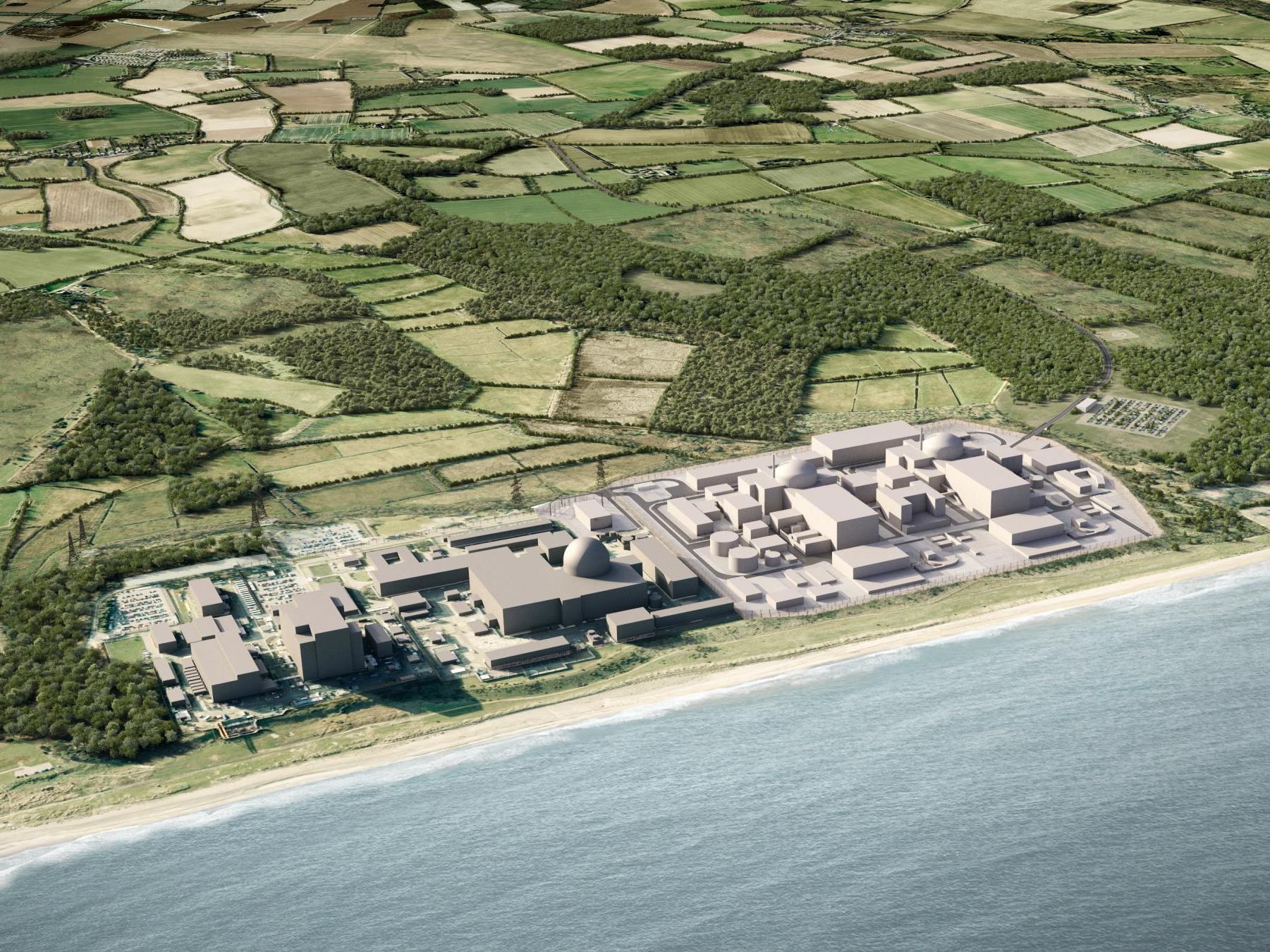New nuclear power plant planned for Suffolk coast ‘would be devastating’ for wildlife
EDF Energy applies for permission to build twin-reactor power station that could generate low-carbon electricity for six million homes, but plans prompt outcry over ‘disastrous’ impact on nature

An energy firm has submitted controversial plans for a nuclear power station that opponents warn will be “catastrophic” for wildlife on the Suffolk coast.
EDF Energy formally requested government permission to build Sizewell C, a 3.2-gigawatt twin-reactor plant that it says would generate enough low-carbon electricity to power six million homes.
But the proposals have been opposed by a string of environmental and nature groups, including the National Trust, as well as local campaigners who fear the coronavirus pandemic will prevent their voices being heard.
EDF delayed its submission to the Planning Inspectorate for two months due to the outbreak of Covid-19, but applied for a development consent order on Wednesday.
The French energy giant, which has partnered with state-owned China General Nuclear to build reactors in the UK, said construction of the plant would be a “huge economic boost” to the region and would create 25,000 jobs and 1,000 apprenticeships. The site would employ 900 staff once operational, the company added.
Humphrey Cadoux-Hudson, the project’s managing director, said: “Sizewell C is a net zero infrastructure project ready to kick-start the economy following the coronavirus crisis.
“On top of the economic benefits, Sizewell C will avoid nine million tonnes of CO2 being pumped into the atmosphere each year. The project will play a key role in lowering emissions while helping the UK keep control of its low carbon future.”
But local campaign group Stop Sizewell C said the proposed plant was the “wrong project in the wrong place”. They have outlined a range of concerns including the diversion of investment from other green energy sources, damage to tourism and nature, and plans to store nuclear waste on the eroding Suffolk coastline.
Alison Downes, the group’s executive director, said: “Sizewell C would be an expensive bridge to nowhere: it will suck vital funds away from the technologies and projects that are more capable of truly transforming our energy landscape.”
She also criticised EDF’s decision to submit its application during the coronavirus lockdown, which she warned meant “there cannot be full public participation in the planning process”.
The National Trust, Suffolk Wildlife Trust (SWT) and RSPB all said the energy firm had failed to provide evidence that its plans would not threaten the area’s rare animal species and protected habitats.
The RSPB said construction may increase erosion and disrupt water levels in neighbouring Minsmere nature reserve, which would be potentially “catastrophic” for species including bitterns, water voles, and otters.
“EDF have not presented us with sufficient evidence that these disastrous impacts can be avoided,” said Adam Rowlands, the RSPB’s area manager for Suffolk. “Without this evidence, we have been forced to conclude, given the levels of uncertainty, that the build must not go ahead given its anticipated impacts on the environment.”
Ben McFarland, SWT’s head of conservation, warned the plans also “suggest the direct loss of nationally important and protected land” on Sizewell Belts, a Site of Special Scientific Interest.
He said: “An area between 10-12 hectares — or roughly ten football pitches — will be covered in concrete. The loss of this nationally rare fen habitat would be devastating and irreplaceable.”
The new nuclear power stations in UK
Show all 4The National Trust has written to the leaders of East Suffolk Council and Suffolk County Council to say it is “deeply concerned” about the plant’s potential impact on Dunwich Heath, an “irreplaceable stretch of the Suffolk coast”.
EDF said it “takes its responsibilities to the environment and local communities seriously and our proposals will provide a biodiversity net gain to the area”.
A spokesperson added: “We have a good track record of looking after nature around our operating power station at Sizewell B and have been awarded the Wildlife Trusts’ Biodiversity Benchmark in recognition of conservation work on the Sizewell estate.”
The company promised to put in place additional measures to make it easier for the public to scrutinise its proposals.
The planning process is likely to take 18 months to complete and the government will make the final decision on whether the project should go ahead.
Sizewell C is planned to be a near replica of Somerset’s Hinkley Point C, which EDF said would reduce construction costs and risks.
But Hinkley Point C, the UK’s first new nuclear power plant since 1995, has been beset by delays and soaring costs. It is now expected to be completed eight years late in 2025 at a cost of £22.5bn, more than double the original estimate.
Subscribe to Independent Premium to bookmark this article
Want to bookmark your favourite articles and stories to read or reference later? Start your Independent Premium subscription today.

Join our commenting forum
Join thought-provoking conversations, follow other Independent readers and see their replies